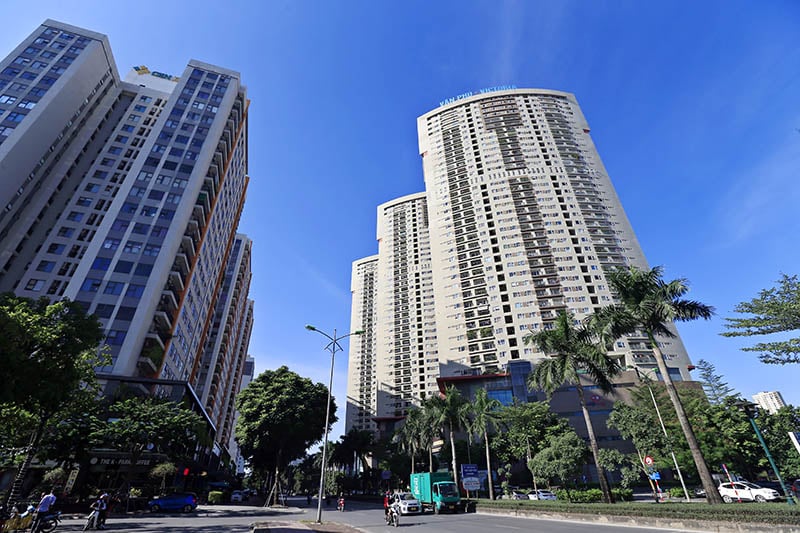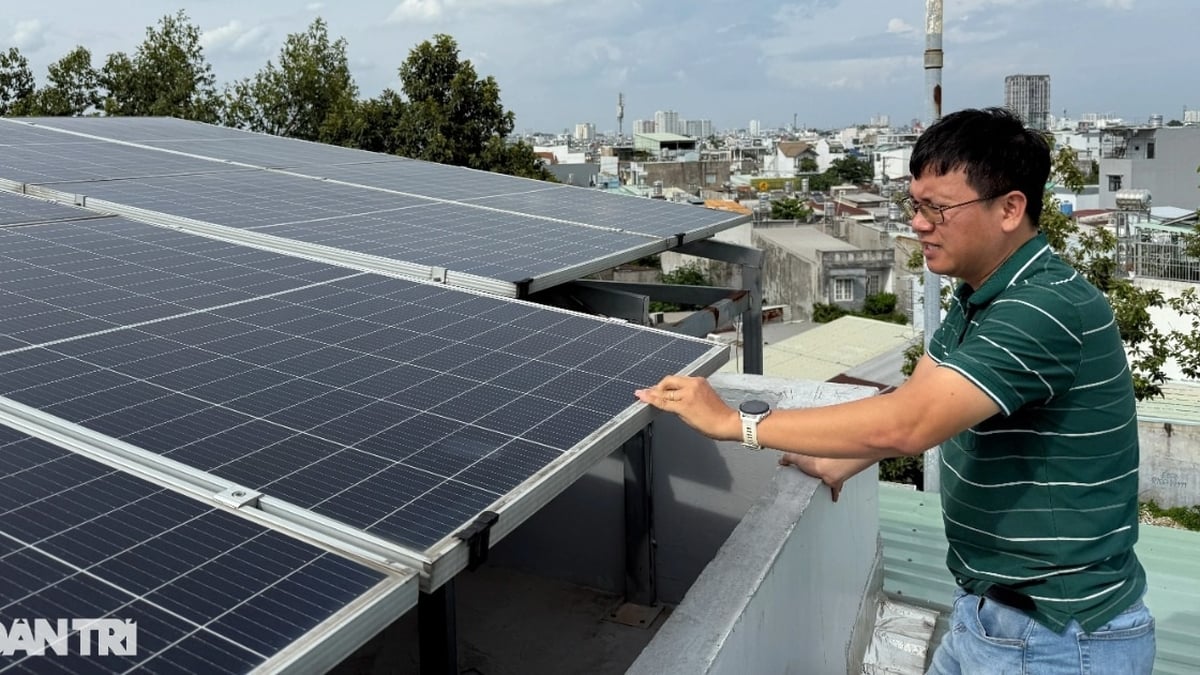Land for commercial housing: Most important is to comply with planning
Reality requires that the pilot expansion of land for commercial housing projects be implemented soon, thereby legalizing it soon to make the best use of land resources.
 |
| The pilot project to implement commercial housing projects is expected to create more momentum for this housing segment. Photo: D.T |
The key is "having the right to use other land"
The 2024 Land Law stipulates that commercial housing projects can only be implemented through agreements on receiving land use rights for residential land; existing land use rights can be used to implement commercial housing projects for residential land or residential land and other land.
Along with the documents guiding the implementation of the law, the Government has assigned the Ministry of Natural Resources and Environment to preside over and coordinate with relevant ministries and branches to develop a Project for the Government to submit to the National Assembly on piloting the implementation of commercial housing projects through agreements on receiving land use rights or having land use rights for other land as prescribed by law.
This project, according to information from Deputy Minister of Natural Resources and Environment Le Minh Ngan, is being accelerated to be submitted to the National Assembly for approval at the 7th Session (May 2024) and take effect together with the Land Law (January 2025).
According to businessman Mai Huu Tin, Chairman of the Binh Duong Province Business Federation, a delegate to the 12th and 13th National Assembly, the key point of the Project is to pilot the implementation of commercial housing projects in cases where "there are rights to use other land".
“If the pilot project mentioned by Deputy Minister Le Minh Ngan solves the above problem and takes effect at the same time as the 2024 Land Law comes into effect, then there is hope that the real estate market will recover, leading to the recovery of the construction, building materials, and interior design industries…”, Mr. Tin told reporters of Dau Tu Newspaper.
The Binh Duong businessman raised the question, if the new Land Law stipulates, how many places have residential land with suitable area for commercial housing projects? Only a few very large real estate developers doing projects of several hundred or several thousand hectares are likely to have a few residential plots that meet the conditions as prescribed by law.
“Most small real estate developers cannot afford to do that. If so, they have to wait to buy clean land from the state and auction it, which means it depends entirely on the state’s ability to have clean land. Therefore, in the near future, it will be very difficult to have new commercial housing supply in the market,” Mr. Tin commented.
Regarding this issue, the Chairman of the Binh Duong Province Business Federation once pointed out that the reality of land use by most enterprises in the Southeast region is that they use their own family land that has existed for many generations or compensate people for land to hand over to the State, and then the State leases the land for production and business purposes. In the South of Binh Duong province alone, including the cities of Di An, Thuan An and Thu Dau Mot, there are thousands of enterprises using such land.
These businesses have all been notified to prepare to cease operations and relocate to industrial parks or concentrated industrial clusters. However, according to the provisions of the 2024 Land Law, even though the land they are using is completely consistent with the new planning for commercial housing development, they are not allowed to develop it themselves, nor are they allowed to transfer it to another business to carry out the development, because they do not have residential land.
In order not to delay the urban development process and not cause damage to businesses, Mr. Tin said that it should be regulated that land users who have the right to use land and propose investment projects in accordance with land use planning, have a request to change the land use purpose and have the competent state agency approve the investment policy, and at the same time approve the investor according to the provisions of the law on investment, then they can use the land to implement commercial housing projects.
Kill two birds with one stone
National Assembly Delegate Vu Tien Loc (Hanoi), former Chairman of the Vietnam Federation of Commerce and Industry (VCCI), expressed his opinion that the important thing is not whether there is residential land or not, but whether the project is suitable for planning or not.
Affirming his strong support for the pilot project to implement commercial housing projects through agreements on receiving land use rights or having land use rights for other land as prescribed by law, Mr. Loc said that this project should be implemented as soon as possible.
“Land for commercial housing is also for housing for the people, and the right to have decent housing is also the people’s right. In the process of national development, there is an urbanization process, including the construction of modern, civilized commercial housing, but suitable for people’s budgets. This will increase the supply of housing, reduce housing prices, and create conditions for more people to access it. It is a one-arrow hitting many targets,” Mr. Loc stated.
Mr. Loc analyzed that when making the planning, the locality had calculated very carefully, so if it is suitable for the planning, then let the investor do the procedures. The important thing is not whether there is land or not, but whether it is suitable for the planning or not. If it is suitable for the planning, then there is no need to hesitate, it should be piloted soon and legalized as soon as the policy is mature enough.
The Hanoi delegate also emphasized the view that he has expressed many times in the parliament that early legalization does not mean waiting for the next revision of the Land Law to include it.
“Laws must be stable, but they must also be for development. If the policy is correct and clear, there is no need to wait 10 years to legislate it. With the view that development should be given top priority, I think that if a policy is issued this year and next year it is found to be unreasonable, and practical requirements require it to be supplemented and amended, then that provision should be amended separately to meet the requirements of life,” Mr. Vu Tien Loc shared.
The former President of VCCI emphasized that life changes every day, so policies also need to be flexible to create conditions for the development of the country and the wealth of the people. If the policy can pave the way for development and make the legal system more complete, then there is no need to be concerned about time.
"The National Assembly has done a great job of turning extraordinary sessions into normal ones, so after the pilot, amending only one article of the Land Law is also normal, as long as the pilot is considered mature enough," said the Hanoi delegate.
Regarding the scope of the pilot, Mr. Loc said that about 5 provinces and cities should be selected, not necessarily implemented in Hanoi and Ho Chi Minh City, but localities with great demand for commercial housing that meet the requirements of the project.
In Official Dispatch No. 15/CD-TTg dated February 19, 2024 on strengthening the work of law-making and completing draft laws submitted to the National Assembly at the 7th Session, the Prime Minister requested to strengthen policy communication right in the process of making proposals for drafting legal documents to create consensus among society and people and ensure conditions for the Vietnam Fatherland Front, people and businesses to participate in quality in the process of drafting and promulgating legal documents.
The Prime Minister also requested to focus on reviewing the content of the project and draft with relevant legal documents to promptly detect and handle conflicts and overlaps between regulations in current legal documents and documents expected to be issued, ensuring the consistency and synchronization of the legal system, removing difficulties and obstacles and creating favorable conditions for production and business activities of enterprises and people's lives.
Source




































































































Comment (0)